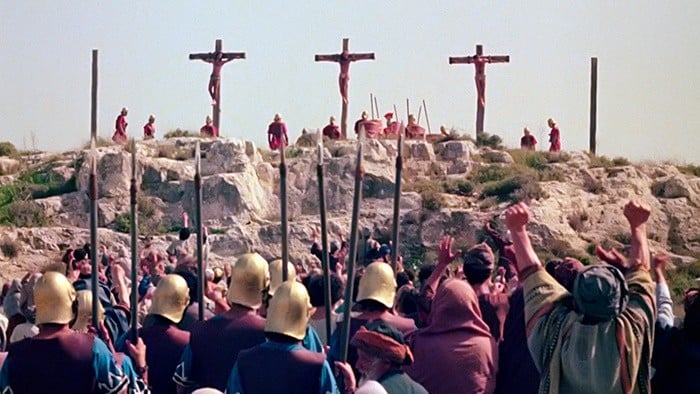The question of who is ultimately responsible for the death of Jesus has always been contentiously debated. The reason it’s such a hot-button topic is that it’s been used as a justification for a lot of anti-semitism.
The truth is that it’s not easy to lay the responsibility for Christ’s death at the feet of any one particular group. But let’s examine some areas where the responsibility lies.
Roman responsibility
There’s no question that Jesus died in a particularly Roman fashion. While Rome didn’t invent the act of crucifixion, they definitely perfected it. What started as a means of humiliating criminals by nailing them to a tree or a stake became much more efficient under the direction of Rome.
Jews didn’t (and legally couldn’t) crucify people. Their executions relied on the more archaic practice of stoning. After the Sanhedrin tries Jesus, they take Him to Pilate with the accusation that He “opposes payment of taxes to Caesar and claims to be Messiah, a king” (Luke 23:2).
Not only did the Romans crucify Jesus, but they were also responsible for a lot of the pain and humiliation surrounding His death. It was Romans who:
- Flogged Him (Matthew 27:26)
- Mocked Him (Matthew 27:27-31)
- Gambled for His clothes (Matthew 27:35)
- Gave Him vinegar to drink (Matthew 27:47-49)
- Stabbed Him to ensure He was dead (John 19:31-34)
It’s impossible to absolve the Romans of their responsibility in Jesus’ death.
Jewish responsibility
There’s no question that almost all of Jesus’ opposition came from the Jewish authorities. They saw Him as a challenge to the Law and their authority.
The kicker seems to have been the cleansing of the temple. This action-coupled with the wild reception Jesus received as He rode into Jerusalem-seemed to inflame the religious authorities.
During Christ’s trial for blasphemy, the Sanhedrin even brought in false witnesses to guarantee a guilty verdict:
“We heard him say, ‘I will destroy this temple made with human hands and in three days will build another, not made with hands.’” Yet even then their testimony did not agree.
Then the high priest stood up before them and asked Jesus, “Are you not going to answer? What is this testimony that these men are bringing against you?” But Jesus remained silent and gave no answer.
Again the high priest asked him, “Are you the Messiah, the Son of the Blessed One?”
“I am,” said Jesus. “And you will see the Son of Man sitting at the right hand of the Mighty One and coming on the clouds of heaven.”
The high priest tore his clothes. “Why do we need any more witnesses?” he asked. “You have heard the blasphemy. What do you think?”
They all condemned him as worthy of death (Mark 14:58-64).
Paul, a Jew himself, seems to lay the responsibility at the feet of the Jews in his letter to the Thessalonican church:
“For you, brothers and sisters, became imitators of God’s churches in Judea, which are in Christ Jesus: You suffered from your own people the same things those churches suffered from the Jews who killed the Lord Jesus and the prophets and also drove us out. They displease God and are hostile to everyone” (I Thessalonians 2:14-15).
But in his sermon at Pentecost, Peter distributes the blame equally. He acknowledges that the Jews didn’t kill Jesus without assistance:
“Fellow Israelites, listen to this: Jesus of Nazareth was a man accredited by God to you by miracles, wonders and signs, which God did among you through him, as you yourselves know. This man was handed over to you by God’s deliberate plan and foreknowledge; and you, with the help of wicked men, put him to death by nailing him to the cross” (Acts 2:22-23).
Our responsibility
The truth is that it doesn’t matter who had Jesus executed. We are all responsible for His death. Jesus was sacrificed for all of our sins.
In John’s first Epistle, the disciple tells us that Jesus was “the atoning sacrifice for our sins, and not only for ours but also for the sins of the whole world” (1 John 2:2). We are both the cause of and the beneficiaries of Christ’s death.
It was the sin of everyone who ever lived that put Jesus on the cross, so it’s pretty futile to point fingers at who was specifically responsible. Paul tells the Romans that God “did not spare his own Son, but gave him up for us all-how will he not also, along with him, graciously give us all things” (Romans 8:32)?
Thankfully, the gospel story doesn’t end on the down note of the crucifixion. Instead, it ends in a glorious celebration of His resurrection. It doesn’t matter who killed Jesus; it matters that through the cross, death has been defeated once and for all.
Or as Paul so eloquently put it, “Death has been swallowed up in victory!” (1 Corinthians 15:54)
All Scripture references quote the New International Version unless otherwise noted.
